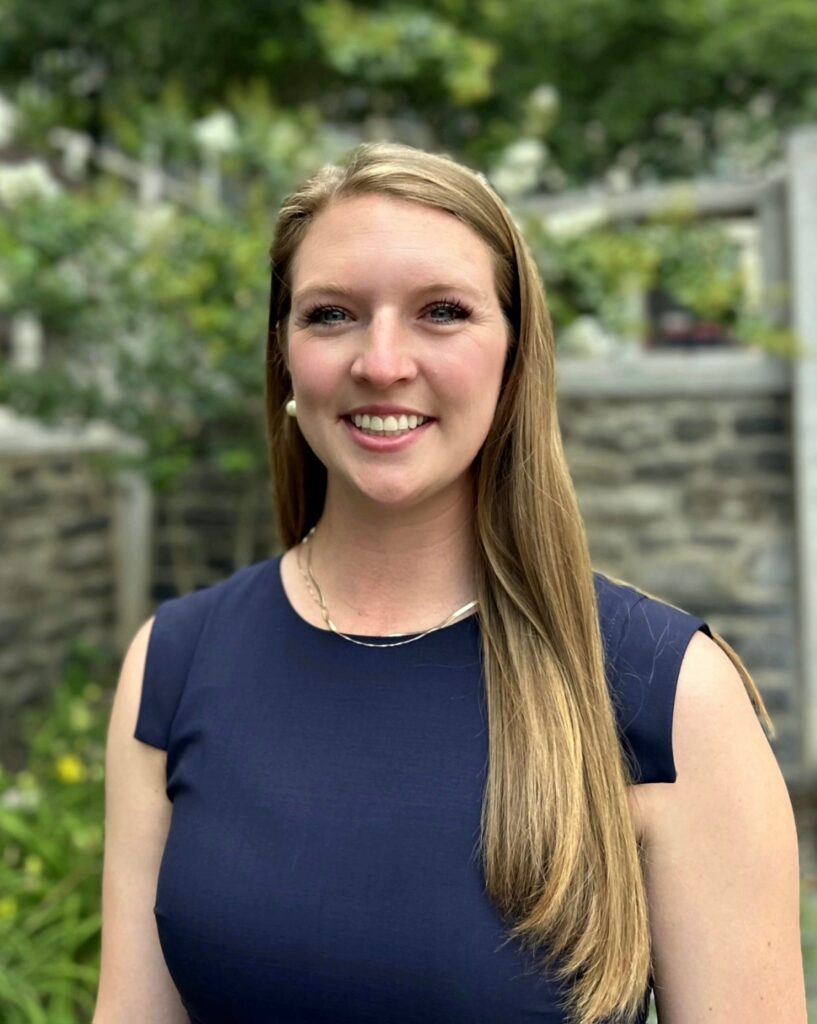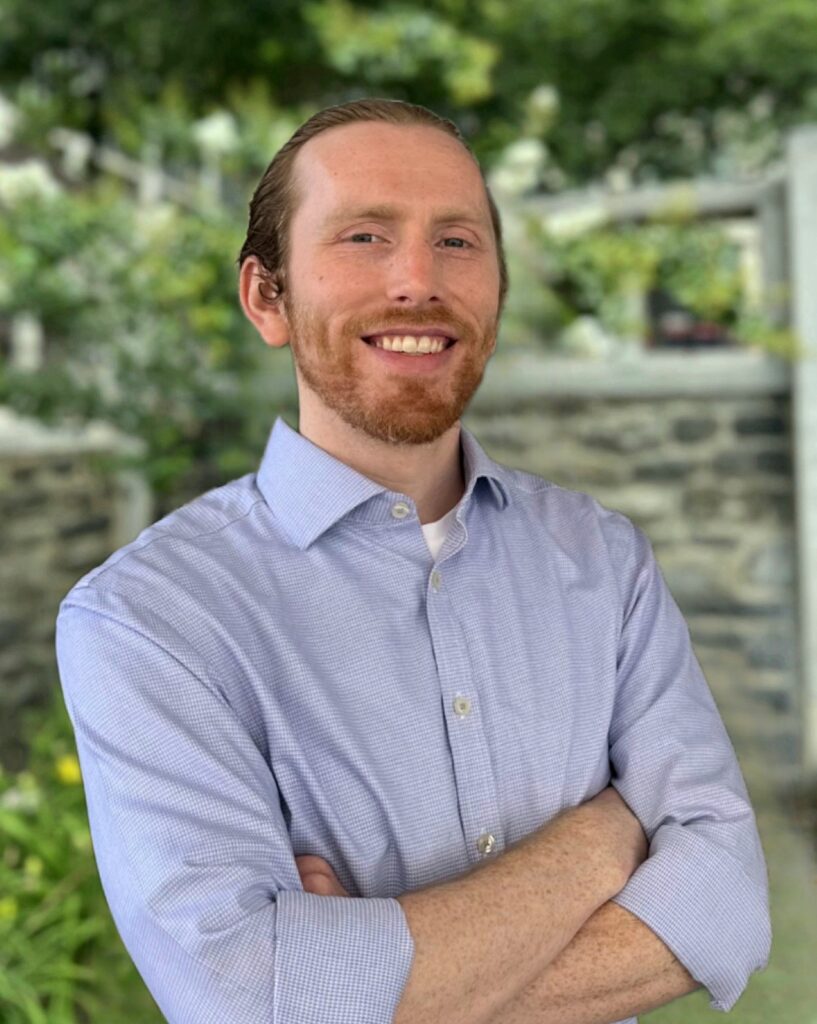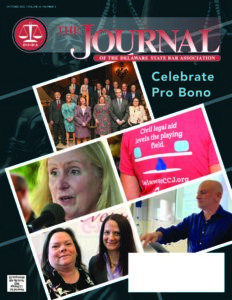Zach Noble started his legal career as a bankruptcy and corporate restructuring associate and Peyton Carper spent four years as a corporate litigation associate, both at large private law firms. Zach and Peyton left their positions in January 2023 and January 2025, respectively, to join Community Legal Aid Society, Inc. (CLASI), one of Delaware’s three civil legal aid agencies that benefits from funds raised by the Combined Campaign for Justice (CCJ). CCJ’s Campaign Manager, Molly McPheeters, caught up with Zach and Peyton to talk about their transitions from private bar associates to public interest advocates.
McPheeters: Zach, Peyton, let’s start at the beginning. What brought you to legal aid?
Noble: Put it this way—I like giving blood. Of course, I’m not perfectly altruistic, and I’m sure my siblings could tell myriad stories of my selfishness, but I truly enjoy feeling like I helped someone. So, I had always planned to do pro bono work. I had some great opportunities at the start of my career, but I ultimately found myself wanting public interest work to be my main professional identity.
Carper: When I worked at a big firm, I was committed to maintaining an active pro bono practice. I felt a sense of responsibility to advocate for vulnerable individuals in my community and beyond. I represented LGBTQ+ asylum seekers, domestic violence survivors, incarcerated individuals in post-conviction proceedings, and parents in guardianship cases. I found this work to be incredibly meaningful. CLASI’s launching of the Family Representation Unit coincided with my exposure to the injustices of the child welfare system. I had a gut feeling that this was the work I needed to do.
McPheeters: Tell us about a client you worked with who had an impact on you.
Noble: I represented a client whose spouse suddenly became physically violent after years of marriage, putting the client and the couple’s children in danger.
It was a real “there but for grace go I” situation. We all put tremendous trust in our families, but any one of us could experience that trust being shattered—even after a long marriage, without much warning.
We helped my client obtain a Protection from Abuse order, and then I represented them in custody and other family law matters. We had to take several matters to trial but ultimately obtained favorable orders, which provided longer term protections for my client and their children.
Throughout the process, my client was obviously stressed, but was also unwaveringly gracious, calm, and supportive. At one point, they told me they appreciated CLASI standing by them, and that comment has stuck with me. When someone is going through a bleak and challenging time, I’m glad organizations like CLASI can provide folks to stand by them.
Carper: I’ve been at CLASI for six months and every single day I am impressed by the resilience and determination of my clients in the face of urgent, life-altering difficulties.
McPheeters: What is something about legal aid work that surprised you and/or that you think your colleagues in the private bar might be surprised to learn?
Carper: I’m still taking client calls late at night.
Noble: And the last-minute settlement, finalized just before lawyers enter the courtroom to start arguing, seems to happen in family law and landlord-tenant cases just as often as it happens in corporate litigation. Maybe I shouldn’t have been surprised by this. People are people, regardless of the court they’re in.
McPheeters: What is the biggest adjustment you’ve had to make during the transition from the private bar to public interest?
Carper: Many of my clients at CLASI are navigating extraordinarily difficult challenges at the same time—ongoing trauma, financial insecurity, and systemic barriers. These challenges are virtually non-existent when representing corporations. CLASI emphasizes trauma-informed advocacy, which has helped me approach client communication with greater patience and sensitivity.
Noble: Getting comfortable directly managing client expectations, i.e., delivering bad news.
McPheeters: How can your colleagues from the private bar support you in your public service work?
Carper: All three of Delaware’s civil legal aid organizations deeply value pro bono partnerships. Law firm time and resources make a real difference.
Noble: In my time at CLASI, I’ve been able to refer a few matters to former colleagues in the private bar. That’s a great thing. If you’re open to any pro bono work, please let us public interest folks know!
Carper: But, if direct representation isn’t feasible, private attorneys and law firms are well-positioned to deepen legal aid’s impact by increasing financial support. Monetary contributions help strengthen access to justice by empowering legal aid organizations to hire and retain experienced attorneys and expand the reach of critical legal services to those who need them the most.
Here’s how you can support Zach and Peyton’s work: Please consider making a tax-deductible donation and becoming a volunteer.
Donate today. First-time donor and/or not sure how much to give? Here are some ideas:
- Donate the value of a billable hour, or whatever feels appropriate to your situation, and provide immediate relief to ensure that we can continue offering vital civil legal services.
- Donate the amount it costs us to handle one case: $1,900.
- In 2024, personal donations to CCJ ranged from $1 to $25,000, with an average individual donation of $1,100.
Volunteer. Reach out to Delaware Volunteer Legal Services, Inc. and take on pro bono cases. Your time and expertise are invaluable resources.

Peyton V. Carper is a Staff Attorney in CLASI’s Family Representation Unit, a multidisciplinary unit that serves indigent parents facing the removal of their children by the Delaware Division of Family Services. Before joining CLASI, Peyton was a litigation associate at Skadden, Arps, Slate, Meagher & Flom LLP. She also clerked on the Delaware Supreme Court for Chief Justice Collins J. Seitz, Jr. and on the Delaware Court of Chancery for Vice Chancellor Tamika Montgomery-Reeves. Peyton received her J.D. summa cum laude from Villanova University Charles Widger School of Law, and her B.S. summa cum laude in Neuroscience from Lebanon Valley College where she played on the women’s basketball team.

J. Zachary Noble is a Staff Attorney with CLASI’s Medical-Legal Partnership, where he primarily handles eviction defense and family law/domestic violence cases. Before joining CLASI, Zach worked as a bankruptcy and corporate restructuring associate with Richards, Layton & Finger, P.A. He received his J.D. from Georgetown University Law Center, and his B.A. cum laude in English and economics from Saint Vincent College.

